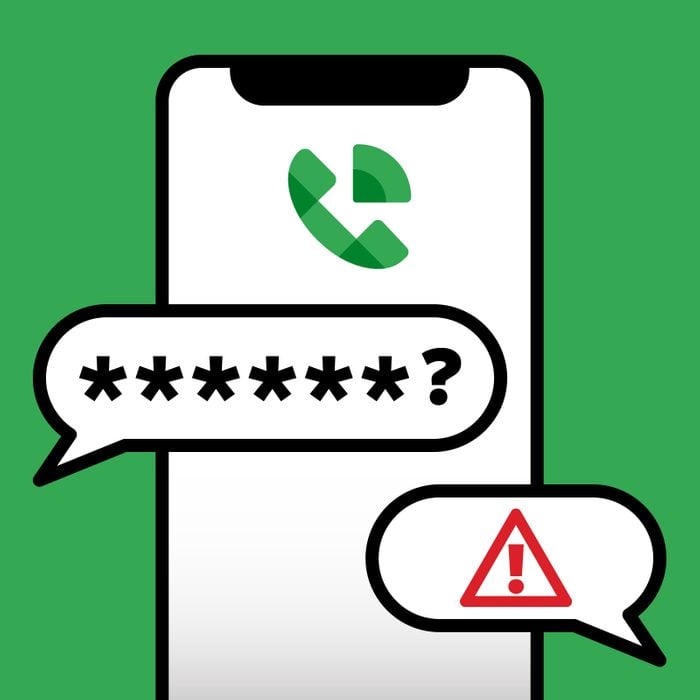What Is the Google Voice Scam, and How Can You Avoid It?
Updated: Dec. 20, 2023

Google Voice scams turn a security measure into a loophole for fraud. Here's how to protect yourself.
These days, online scams, AI voice scams and phone call scams are a dime a dozen. But while you may be familiar with car extended warranty scams and other cons that regularly make the news, you’re probably less familiar with Google Voice scams. And yet they’re more common than you may think. In January 2022, the Federal Bureau of Investigation issued a formal warning to consumers about the scam, and as of September 2022, the Identity Theft Resource Center reported that nearly half the complaints it received were about Google Voice scams.
Here’s how it works: You’re selling an iPad online, and you get a message from someone who absolutely loves it and is eager to buy it immediately—sight unseen— for your full asking price, or even a bit more. But could you just do a little something for them first to prove you’re legit? All they ask is for you to text them a six-digit code that Google will send you. Sure enough, the code pops up in your texts. You might think it seems a little strange, but it can’t hurt to reassure them, right? After all, you don’t want to miss this opportunity. They’re kind of in a hurry, so can you do it already and—
Stop! You’re about to get seriously scammed. Keep reading to find out everything you need to know about Google Voice scams and other two-factor authentication scams—plus tips for avoiding these common cons.
Get Reader’s Digest’s Read Up newsletter for more tech, humor, cleaning, travel and fun facts all week long.
What is a Google Voice scam?
Bad guys can do a whole lot with just your phone number, so if you include it in a post when selling items online, don’t be surprised if fraudsters jump at the chance to swindle you out of money.
In fact, your phone number and that verification code are all a scammer needs to set up a Google Voice number attached to your phone number, says Matt Hathaway, a cybersecurity expert and the chief marketing and strategy officer at TrueFort, a cybersecurity company.
Scammers can then use the Google Voice number to perpetrate more scams, which will be traced back to you, not them, says Oliver Noble, a cybersecurity expert at NordLocker, a company that secures information in the cloud. They may also use that code as a way to break into your Google account and other accounts that use two-factor authentication, like your email, or to get additional information about you that they can use to steal your identity, he adds.
How the Google Voice scam works
Google Voice provides free U.S. phone numbers, allowing users to make calls and send messages via the web or any mobile device. But the service isn’t a free-for-all—you’ll need a Google account and a U.S. phone number to connect it to.
“The weak link that is easily exploitable by scammers appears during the sign-up process, when users receive a text message with a Google Voice verification code,” says Noble. Ironically, the two-factor authentication code is Google’s way of making it harder for bad actors to use random phone numbers to sign up for Google Voice. But scammers capitalize on human trust to get around it.
So what’s a simple way to trick people into giving a stranger that six-digit verification code? Promise them something they want. Scammers usually offer to buy an item you’re selling on Craigslist, OfferUp or Facebook Marketplace, rent an apartment you’ve listed or return a lost pet.
In the next phase of the con, the scammers use your phone number to sign up for a Google Voice number, then tell you they simply need to prove you’re real, prove you own the item or pet, or even prove you’re not a scammer. The excuses are endless and always fake. The entire goal is to trick you into giving them a verification code.
Adding a sense of legitimacy (and fooling you even further) is the fact that the code comes from Google. That’s because the scammers have signed up for Google Voice with your number, and Google automatically sends a six-digit code to your phone. Give the code to scammers, and they’ll use it to connect their scam account to your real number. And you’ll never hear from them again.
Red flags of Google Voice scams
The primary tip-off that someone is trying to pull a Google Voice verification code scam is that they tell you they are going to send a code to your phone and ask you to read it or text it to them.
But there are a few more-subtle red flags you should always be on the lookout for when it comes to a Google Voice code scam or, for that matter, any other scam, says Hathaway.
-
Provoking a strong emotion. It’s easier to manipulate you if you’re very excited, scared, angry or greedy, because you’ll be more willing to overlook other red flags. Scammers may also tell you a sob story—saying the item is for a dying child, for instance—to prey on your empathy.
-
Creating urgency. If you feel like you have to act fast to close on the amazing deal or get your beloved pet back, then you’ll be more likely to ignore your instincts.
-
Offering a deal that is too good to be true. Time is of the essence for these scammers, so they don’t want you to think twice about accepting their offer. They’ll often offer more than your asking price for a quick resolution.
-
Confusing details. Don’t forget that phone numbers and emails can be “spoofed,” so it may seem like you’re corresponding with a legitimate person or company rather than a scammer. Pay attention to any details that don’t seem logical or correct. That’s a sign you’re talking to a con artist.
How to avoid getting scammed
Bottom line: Never, ever give a verification code to anyone for any reason. Two-factor authentication—having a secure code in addition to entering your password—is one of the best ways to stay safe online, but you negate that protection if you give out the code. Remember, the only time you should be using these codes is when you type them into a website yourself to verify your identity for the organization that sent you the code, says Noble.
If someone is preying on your emotions, pressuring you to hurry or offering something too good to be true, or if their details don’t add up, take a step back and reassess what’s happening. These pro tips will also keep you safe from gift card scams, Amazon scams and bank scams.
What to do if you’ve been scammed
If you’ve fallen victim to the Google Voice scam, don’t panic or feel guilty. You’re not dumb or a sucker—these scammers are smart and do this all day, every day. Feeling ashamed or angry will only keep you from acting quickly, and time is of the essence.
Immediately change your Google password and any passwords associated with accounts linked to your phone number, says Noble. Don’t forget social media accounts, utility companies and banks, as they all use your phone number. As you update, focus on password security. Pro tip: Using a password manager can help you keep track of multiple complex, unique passwords.
Turn on two-factor authentication if you don’t already have it. And commit to never again sharing authentication codes with anyone.
Google’s website offers clear steps for reclaiming your phone number from Google Voice. This should be the only recovery help you seek—and that’s crucial to keep in mind, because thieves often run recovery scams.
Once the Google Voice scam is complete, the same fraudster or an associate may reach out to you again, pretending to be someone who can fix the issue or reclaim your number, lost items or money—for a fee. This is a common scam, and it does nothing to help you. You’ll just lose your money. Do not give people offering recovery services any passwords, usernames, phone numbers or verification codes.
Safe buying and selling tips
When buying or selling items online, listing or renting an apartment or home, posting about a lost pet, or doing anything else that would require people to contact you, our experts offer these tips for staying safe and avoiding scams:
-
Don’t list your real phone number. Set up a Google Voice number yourself and give that one to people instead.
-
Stick to email communications. Plenty of scams take place through email, but Google Voice scams won’t work if scammers don’t have your phone number.
-
Don’t accept money or pay through Zelle, Venmo or Cash App; personal checks, bank checks or cashier’s checks; or Western Union or wire transfers.
-
For local transactions, ask to meet in person at a police station, grocery store or other public place. Most scammers aren’t even in the same country, so this will weed out a lot of bad actors.
-
For transactions that require shipping, conduct the transaction through a secure buying and selling site, like eBay or Poshmark, and do not have any contact outside that site.
“The best way to avoid scams, in general, is to force others to earn your trust,” says Hathaway. “Do your own research and question everything.”
Sources:
- Matt Hathaway, cybersecurity expert and chief marketing and strategy officer at TrueFort
- Oliver Noble, cybersecurity expert at NordLocker
- Federal Trade Commission: “The Google Voice Scam: How This Verification Code Scam Works and How to Avoid It”
- Federal Bureau of Investigation: “Oregon FBI Tech Tuesday: Building a Digital Defense Against Google Voice Authentication Scams”
- Fox 26 Houston: “Nearly Half of Complaints to Identity Theft Resource Center Were About Google Voice Scam”



